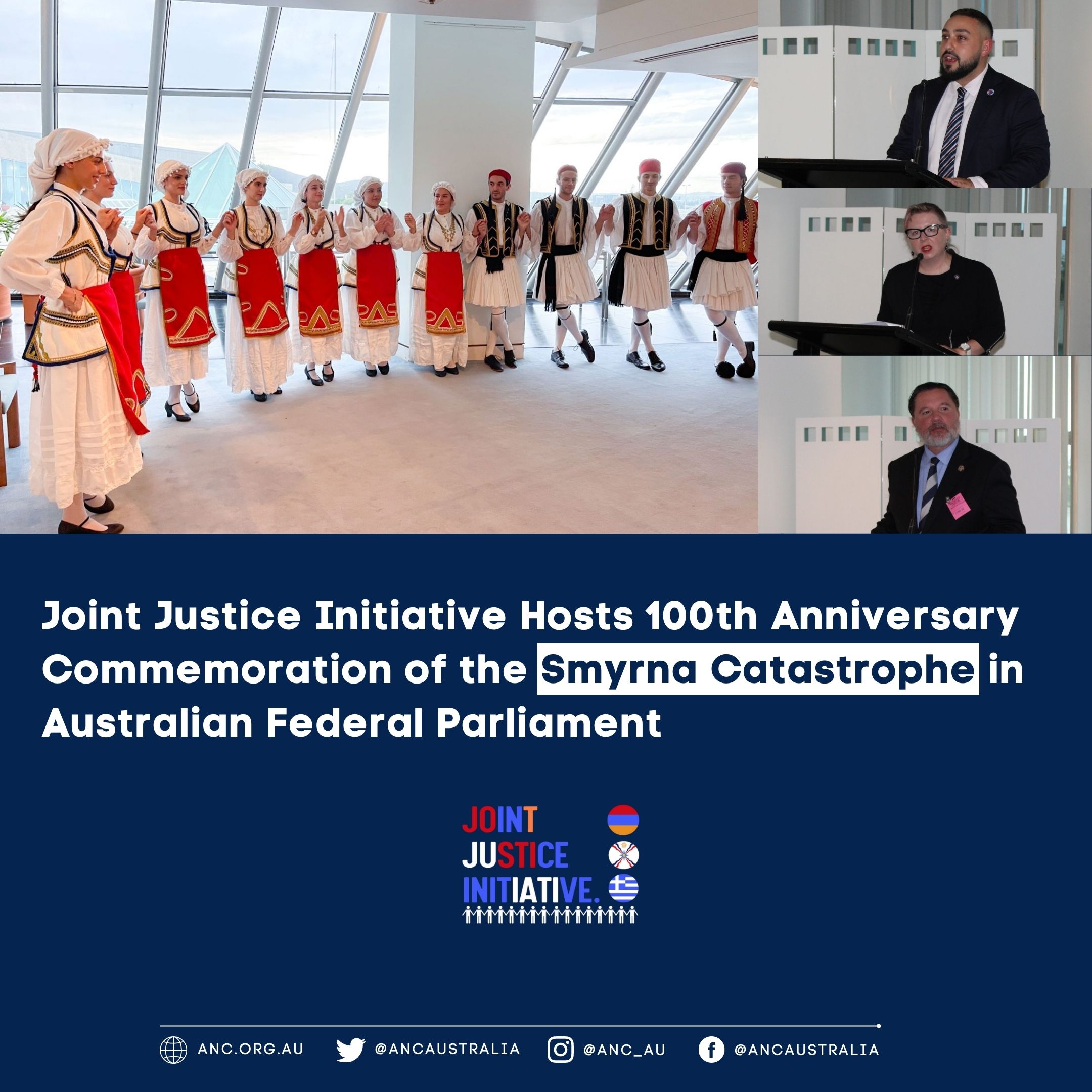Joint Justice Initiative Hosts 100th Commemoration of the Smyrna Catastrophe in Australian Federal Parliament
By ANC-AU | Monday, 27 March 2023

CANBERRA: In the presence of over 80 dignitaries, the peak advocacy bodies of the Armenian-Australian, Assyrian-Australian and Greek-Australian communities hosted the centenary commemoration of the Smyrna Catastrophe in Australia's Federal Parliament, reported the Joint Justice Initiative (JJI).The cocktail event, which was presented as a celebration of survival by the three genocide survivor communities who formed the Joint Justice Initiative to call for Federal Australian recognition of the 1915 Genocides, was held on Monday 20th March 2023 at the Parliament House’s Eden Lyons Alcove event venue.Among the attendees were Federal parliamentarians, diplomats, departmental officials, political staffers, academics, media, religious and community leaders, who were treated to Greek cultural performances from the Canberra Hellenic Dancers, canapés and beverages throughout the evening, as representatives of the three communities reaffirmed their joint commitment to seeing Australia recognise the Turkish-committed Genocide against the Armenian, Greek and Assyrian citizens of the Ottoman Empire during World War I.Federal parliamentarians in attendance included the Vice Chairs of the Australia-Armenia Inter-Parliamentary Union, Jerome Laxale MP, Member for Bennelong and Paul Fletcher MP, Member for Bradfield, and their parliamentary colleagues, Sophie Scamps MP, Steve Georganas MP, Kylea Tink MP, Matt Burnell MP, Senator David Shoebridge, Senator Janet Rice, Senator Andrew Bragg, Tony Zappia MP, Andrew Charlton MP. Australian Capital Territory parliamentarian Peter Cain MLA was also present.The guest list also included the Greek Ambassador to Australia, His Excellency Georges Papacostas; Elizabeth Stone - General Secretary of the National Council of Churches Australia, and several academics, religious and community leaders.President of the International Association of Genocide Scholars, Dr Melanie O’Brien, who headlined the inaugural JJI Advocacy Week, addressed attendees on the importance of Genocide recognition and the need for Australia to add its well-respected voice to the over 35 nations worldwide that have accurately characterised the massacres against Armenians, Assyrians and Greeks as Genocides.Speaking to the importance of recognition in Australia, Dr O’Brien said: “We know that Turkey has still not forgotten the past actions against the Greeks, Assyrians and Armenians. In fact, in September last year, President Erdogan referred specifically to Smyrna. He spoke about stoushes over the Greek/Turkish border and allegations of military engagement between both countries. In response, he said, and I quote: 'Hey Greece, take a look at history… If you go further, you will pay a heavy price... When the time comes, we will do what’s necessary [, and as] we say, we may come suddenly one night'.”Throughout the night, representatives from the three organising communities including Armenian National Committee of Australia (ANC-AU) Executive Director Michael Kolokossian, Dr Panayiotis Diamadis from the Australian Hellenic Council and President of the Assyrian National Council - Australia, Hermiz Shahen, addressed attendees.The Smyrna Catastrophe, also commonly referred to as the ‘Burning of Smyrna’, is a solemn occasion for many Greek-Australians who recall the atrocities against 100,000+ innocent lives were lost, and hundreds of thousands of Armenian and Greek refugees had to flee their homes after the city was lit on fire by the Ottoman Empire.Michael Kolokossian stated: “We’d like to sincerely thank all those that took the time to attend this event in solidarity with the Armenian, Greek, and Assyrian communities. It is humbling to see parliamentarians of broad backgrounds and beliefs come together to commemorate this, sadly, little-known historical tragedy.”“The Joint Justice Initiative will continue to organise important events like this and work on bringing leaders together to finally achieve the justice our communities seek,” Kolokossian added.Shahen added: “Recognition of the past genocide is not only a matter of justice for the victims and their descendants, but also a necessary step towards preventing future atrocities and ensuring the protection of vulnerable populations.”
